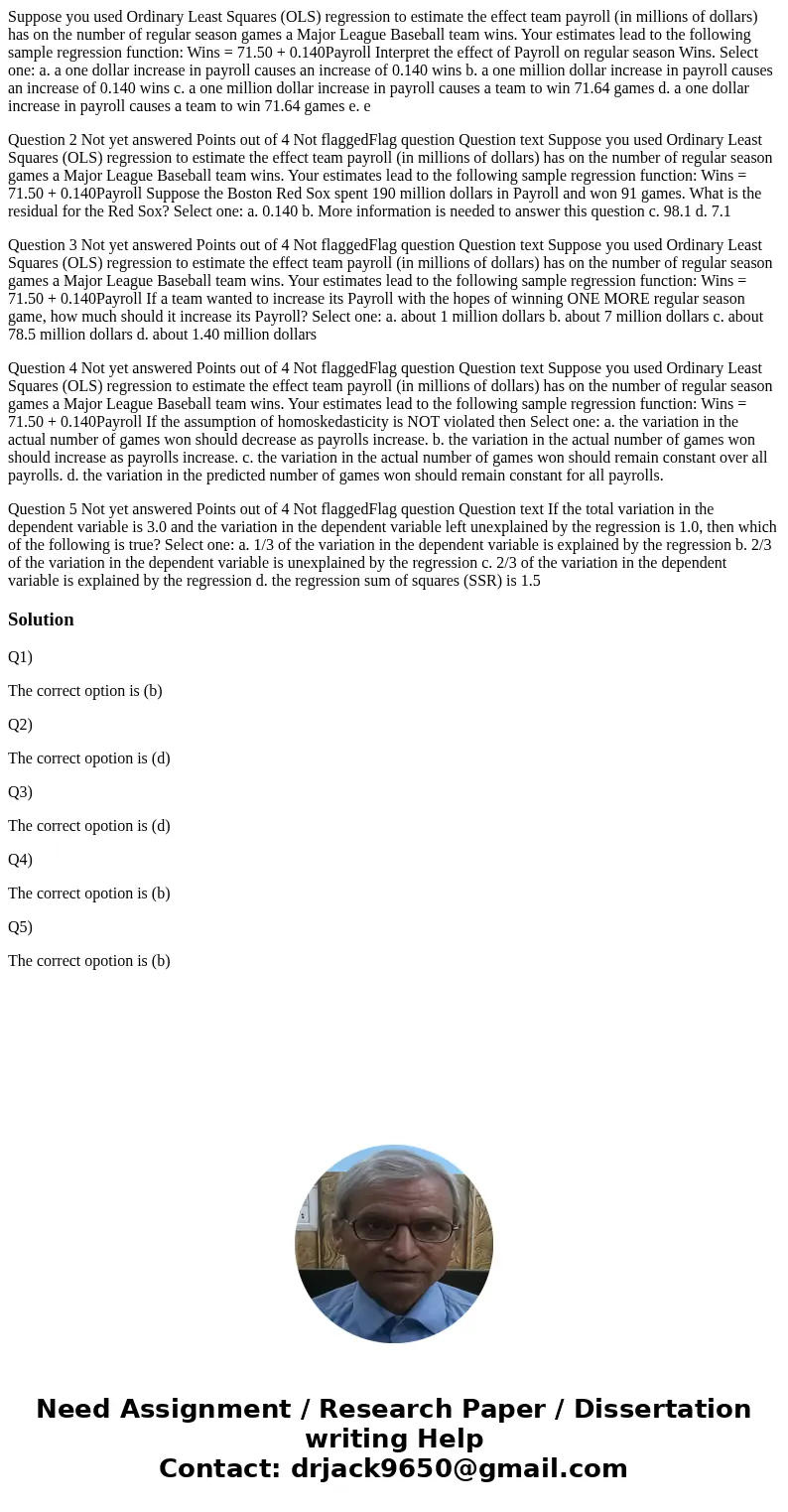Suppose you used Ordinary Least Squares OLS regression to es
Suppose you used Ordinary Least Squares (OLS) regression to estimate the effect team payroll (in millions of dollars) has on the number of regular season games a Major League Baseball team wins. Your estimates lead to the following sample regression function: Wins = 71.50 + 0.140Payroll Interpret the effect of Payroll on regular season Wins. Select one: a. a one dollar increase in payroll causes an increase of 0.140 wins b. a one million dollar increase in payroll causes an increase of 0.140 wins c. a one million dollar increase in payroll causes a team to win 71.64 games d. a one dollar increase in payroll causes a team to win 71.64 games e. e
Question 2 Not yet answered Points out of 4 Not flaggedFlag question Question text Suppose you used Ordinary Least Squares (OLS) regression to estimate the effect team payroll (in millions of dollars) has on the number of regular season games a Major League Baseball team wins. Your estimates lead to the following sample regression function: Wins = 71.50 + 0.140Payroll Suppose the Boston Red Sox spent 190 million dollars in Payroll and won 91 games. What is the residual for the Red Sox? Select one: a. 0.140 b. More information is needed to answer this question c. 98.1 d. 7.1
Question 3 Not yet answered Points out of 4 Not flaggedFlag question Question text Suppose you used Ordinary Least Squares (OLS) regression to estimate the effect team payroll (in millions of dollars) has on the number of regular season games a Major League Baseball team wins. Your estimates lead to the following sample regression function: Wins = 71.50 + 0.140Payroll If a team wanted to increase its Payroll with the hopes of winning ONE MORE regular season game, how much should it increase its Payroll? Select one: a. about 1 million dollars b. about 7 million dollars c. about 78.5 million dollars d. about 1.40 million dollars
Question 4 Not yet answered Points out of 4 Not flaggedFlag question Question text Suppose you used Ordinary Least Squares (OLS) regression to estimate the effect team payroll (in millions of dollars) has on the number of regular season games a Major League Baseball team wins. Your estimates lead to the following sample regression function: Wins = 71.50 + 0.140Payroll If the assumption of homoskedasticity is NOT violated then Select one: a. the variation in the actual number of games won should decrease as payrolls increase. b. the variation in the actual number of games won should increase as payrolls increase. c. the variation in the actual number of games won should remain constant over all payrolls. d. the variation in the predicted number of games won should remain constant for all payrolls.
Question 5 Not yet answered Points out of 4 Not flaggedFlag question Question text If the total variation in the dependent variable is 3.0 and the variation in the dependent variable left unexplained by the regression is 1.0, then which of the following is true? Select one: a. 1/3 of the variation in the dependent variable is explained by the regression b. 2/3 of the variation in the dependent variable is unexplained by the regression c. 2/3 of the variation in the dependent variable is explained by the regression d. the regression sum of squares (SSR) is 1.5
Solution
Q1)
The correct option is (b)
Q2)
The correct opotion is (d)
Q3)
The correct opotion is (d)
Q4)
The correct opotion is (b)
Q5)
The correct opotion is (b)

 Homework Sourse
Homework Sourse